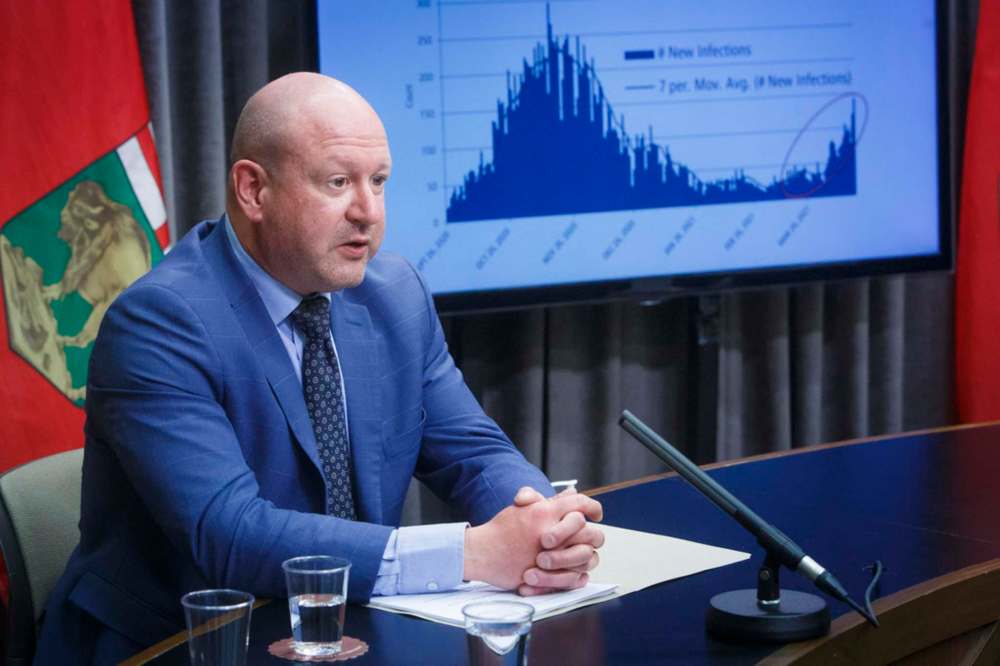Manitoba’s focus on ‘least restrictive’ measures shows less is not more
Read this article for free:
or
Already have an account? Log in here »
To continue reading, please subscribe:
Monthly Digital Subscription
$0 for the first 4 weeks*
- Enjoy unlimited reading on winnipegfreepress.com
- Read the E-Edition, our digital replica newspaper
- Access News Break, our award-winning app
- Play interactive puzzles
*No charge for 4 weeks then price increases to the regular rate of $19.00 plus GST every four weeks. Offer available to new and qualified returning subscribers only. Cancel any time.
Monthly Digital Subscription
$4.75/week*
- Enjoy unlimited reading on winnipegfreepress.com
- Read the E-Edition, our digital replica newspaper
- Access News Break, our award-winning app
- Play interactive puzzles
*Billed as $19 plus GST every four weeks. Cancel any time.
To continue reading, please subscribe:
Add Free Press access to your Brandon Sun subscription for only an additional
$1 for the first 4 weeks*
*Your next subscription payment will increase by $1.00 and you will be charged $16.99 plus GST for four weeks. After four weeks, your payment will increase to $23.99 plus GST every four weeks.
Read unlimited articles for free today:
or
Already have an account? Log in here »
Hey there, time traveller!
This article was published 07/06/2021 (1650 days ago), so information in it may no longer be current.
What if we got it all wrong?
Throughout the pandemic, Premier Brian Pallister and Dr. Brent Roussin, the chief provincial health officer, have preached the merits of a “least restrictive means” approach, where social and economic restrictions are increased slowly and iteratively as the severity of the COVID-19 outbreak increased.
Despite clear evidence of the flaws in this approach — twice Manitoba has generated the worst outbreaks in North America — Pallister and Roussin, along with other public health experts working within the government, have clung faithfully to the idea less-restrictive measures will ultimately result in more positive results.
In testimony during a recent constitutional challenge of the restrictions, Roussin went as far as to suggest he is “bound” to use the least-restrictive means in every decision he recommends.

Current public health orders are slated to expire on June 12, and there are strong hints that — despite an average of 200 new cases a day and overflowing hospitals — some restrictions could be eased before the end of the week. Roussin amplified those expectations Monday when he said it appears Manitoba is “very likely on that downtrend of the third wave.”
But is it really time to ease back on restrictions? When it comes time to reveal their decision, you can bet Pallister and Roussin will rely heavily on the doctrine of least-restrictive means. And that, in and of itself, is a source of concern for epidemiologists and public health experts outside government.
One of those outside sources is Dr. Ross Upshur, an internationally recognized expert in public health and, unofficially, godfather of the doctrine of least-restrictive means.
In 2002, Upshur wrote a summary ethics framework for public health interventions that has become widely circulated and discussed among public health experts in this country and beyond. Upshur’s framework describes four principles — questions really — to be considered when designing any public health intervention.

Does the action prevent or reduce harm to individuals and groups? Can the same ends be achieved in a way that is less restrictive of individual or group freedoms? Will individuals or groups most impacted by restrictions be compensated? And, was the decision to intervene dominated by one group or subject to political interference?
“The spirit of the (least-restrictive means) concept is to be respectful of the fact that we live in a liberal democracy and we have come to expect certain freedoms,” Upshur said in an interview. “And anything that threatens those freedoms should only be done with good reason. We do need to strike that balance as much as possible.”
That having been said, Upshur noted it is wrong to interpret “least-restrictive means” as only the slow, iterative application of more severe restrictions, which has been the approach in Manitoba. That is not the best strategy during a pandemic with rapidly mutating strains of virus, as is the case right now.
“We need to be willing to move forward with restrictive measures and then dial them back as conditions improve,” Upshur said. “And in a situation where there is concern about variants, you would want to be more aggressive at the outset. By not being more aggressive, you may actually be prolonging your suffering by not being strict enough at the beginning.”
“… In a situation where there is concern about variants, you would want to be more aggressive at the outset. By not being more aggressive, you may actually be prolonging your suffering by not being strict enough at the beginning.”
– Dr. Ross Upshur
Upshur’s comments are consistent with criticism from medical and scientific experts who believe the Pallister government has been too slow in introducing restrictions prior to clearly incoming surges.
Leading up to and during the second COVID-19 wave late last year, Pallister resisted measures like mandatory indoor mask mandates and stay-at-home orders while allowing social gatherings and concessions for maskless indoor church services.
Even in the midst of the devastating third wave, Pallister balked at a full lockdown, electing to keep non-essential retail open and allowing people to largely police themselves on social gatherings between households.
University of Manitoba epidemiologist Dr. James Blanchard, a Canada Research Chair in epidemiology and global public health, said by applying a very literal interpretation of least-restrictive means, the Pallister government has consistently missed opportunities to reduce the overall cases and deaths from each wave of COVID-19.
“If you see a wave coming, by using least-restrictive means and doing it incrementally you’re really only setting the stage for much-worse outcomes.”
– University of Manitoba epidemiologist Dr. James Blanchard
“If you see a wave coming, by using least-restrictive means and doing it incrementally you’re really only setting the stage for much-worse outcomes,” said Blanchard. “If you look at the outcomes, then it could be argued that the application of least-restrictive means is to have an earlier and sharper lockdown. You would not only be in lockdown for a shorter period of time, but you’d also save a lot of lives. If you wait and do less, then you have restrictive means for longer with more lives lost.”
Both Blanchard and Upshur agreed it is never easy to impose restrictions, and that they should never be applied in a rash manner. However, both said all pandemic management strategies must aim to achieve the best possible outcomes, which means as little sickness and death as possible.
“If the circumstances dictate that you impose more restrictive measures,” Upshur said, “and that they will be more effective in protecting people, then you have to have the courage to do that.”
Manitobans have consistently been told that less restrictions would result in more positive outcomes. Instead, the Pallister government has shown us, once again, that less almost always means less.
dan.lett@freepress.mb.ca

Born and raised in and around Toronto, Dan Lett came to Winnipeg in 1986, less than a year out of journalism school with a lifelong dream to be a newspaper reporter.
Our newsroom depends on a growing audience of readers to power our journalism. If you are not a paid reader, please consider becoming a subscriber.
Our newsroom depends on its audience of readers to power our journalism. Thank you for your support.






.jpg?h=215)
